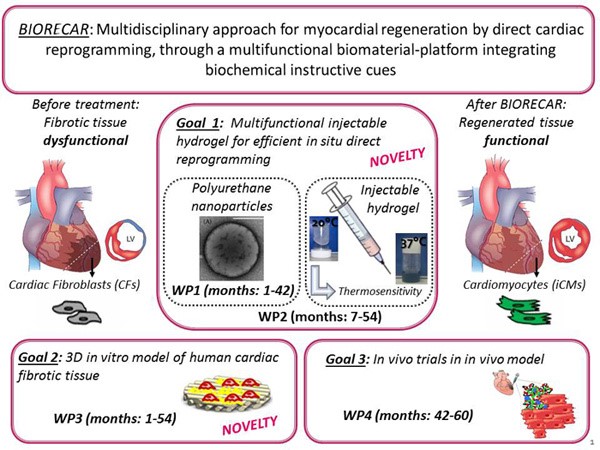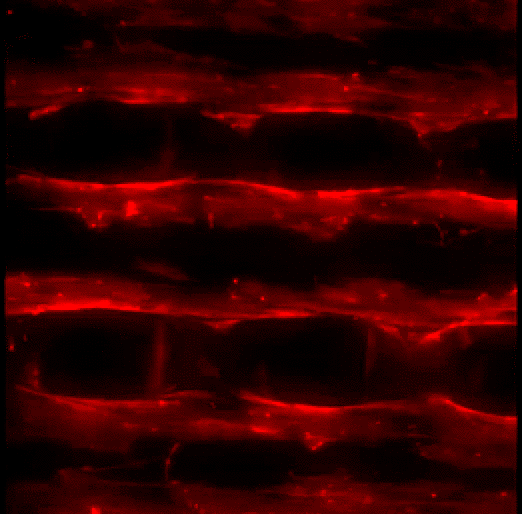Research
Abstract
The BIORECAR project proposes an innovative and multidisciplinary approach for in situ "direct reprogramming" of infarcted heart tissue into functional cardiac tissue, using bioengineering tools, including biomimetic biomaterials and nanomedicine.
Description of the research project
Around 70-85% of the volume of the adult mammalian heart is occupied by cardiomyocytes, the cardiac muscular cells that allow concerted contractile activity. Myocardial infarction is caused by the obstruction of coronary arteries, resulting in the death of approximately 1 billion cardiomyocytes in the left ventricle in a few hours, with the progressive formation of a fibrotic scar. Fibrotic tissue is mechanically stiffer than healthy cardiac tissue, is mainly populated by cardiac fibroblasts, but lacks beating cardiomyocytes, hence it is unable to undergo contraction.
In BIORECAR I propose a new regenerative medicine approach to recover myocardial functional contractility in the post-infarct fibrotic tissue. The selected approach is based on direct cell reprogramming and integrates nanomedicine, biomaterials science and tissue engineering. The project foresees the design of innovative polymeric nanoparticles, for the targeted reprogramming of cells populating the post-infarct fibrotic scar (cardiac fibroblasts), modifying their gene expression, to convert them into cardiomyocytes.
The nanoparticles will be directly administered into the infarcted tissue through an injectable hydrogel, provided with further functionalities to reinforce cell reprogramming. The approach will be validated in an in vitro model of human fibrotic cardiac tissue, then tested in an in vivo model.

Lab Facilities
Scientific research on direct cell reprogramming and 3D in vitro modelling is carried out in the new BIORECAR lab located at Politecnico di Torino (responsible: prof. Valeria Chiono).
The lab provides a wide range of state-of-the-art instruments, allowing cell culture and analyses, polymer processing, 3D scaffold manufacturing and bioprinting.
In particular, BIORECAR lab is equipped with:
- Class II bio-safety cabinet together with CO2 incubator and Ultrafreezer storage unit
- Automated Fluorescence Microscope (Nikon Eclipse Ti2) equipped with monochrome CMOS senser camera (Nikon DS-Qi2)
- Flow Cytometer (Guava EasyCyte)
- 3D Bioprinter (Rokit Invivo)
- Chemidoc Imaging System (Biorad)
- Cryostat (Leica Systems)
- Multi-Mode Reader (Biotek Instruments)
- Qubit fluorometer (Thermo Fisher Scientific)
- Multi-mode Centrifuge (Beckman Coulter)



Impact on society
Ischemic heart disease is the current leading cause of mortality and morbidity in the industrialized world with more than 26 million cases worldwide. The only standard therapy addressing the irreversible loss of functional cardiomyocytes is heart transplantation. The development of cardiac regenerative therapies, which is the aim of BIORECAR, is a major clinical challenge with a deep socio-economic impact.
Concerning the scientific impact, the project will open a new multidisciplinary research line in Europe, on direct cardiac reprogramming which is currently studied mainly in the US.